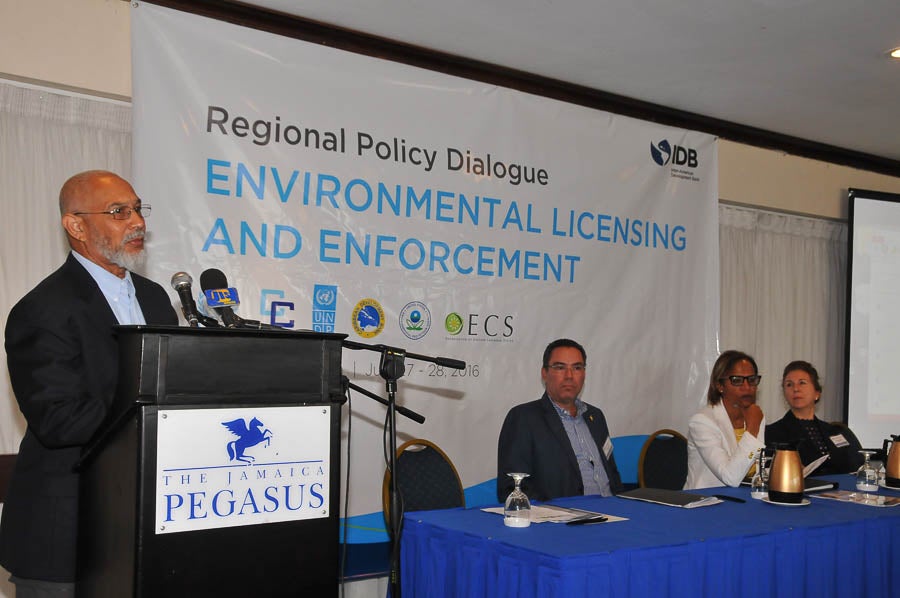The IDB has made a strong commitment to strengthening and using country systems for both fiduciary and non-fiduciary aspects of Bank loans. While notable progress has been made in the former, the latter, which include national systems for development effectiveness and environmental and social safeguards, require different approaches. Notably, and recognizing the diversity of environmental and social governance approaches in our region, IDB’s approach for the strengthening and use of safeguard systems has been focused on country dialogue, capacity building and controlled pilot studies in different sectors. While all three are critical as we move ahead, country dialogue – listening to our countries and understanding how their systems work—is the foundation from which other activities must be built. 
In July, the IDB hosted a Regional Policy Dialogue on Environmental Licensing and Enforcement in Jamaica that brought together some 40 high-level technical officials from the Caribbean to discuss common challenges and successes of environmental licensing and enforcement. Here are four things we learned from participants:
1. Country safeguard systems in the Caribbean are diversely organized
Environmental licensing and enforcement systems in the region can loosely be grouped in three conceptual models:
Central advisory body: In countries including the Bahamas and Suriname, a central advisory body attached to an environmental ministry administers the licensing and enforcement process, sometimes without formal or legislatively established regulatory provisions. The advisory body carries out the review of project ESIAs, grants licenses, and is responsible for enforcing implementation of norms.
Land Use Planning authorities: In countries such as Antigua and Barbuda, Barbados, and St. Vincent and the Grenadines, licensing and compliance are administered by land use planning boards. Project ESIAs are required either as mandated by law, or as determined by the Chief Town Planner, and notices are sent to enforce implementation.
 Legislative bodies: In countries including Belize, Guyana, Haiti, Jamaica, and Trinidad & Tobago, a dedicated Department or Ministry is primarily responsible for the licensing and enforcement process, though Town and Country Boards often still exist. Project ESIAs are mandated by legislation in varying degrees of detail. A dedicated unit is responsible for enforcing compliance, and noncompliance may result in penalties.
Legislative bodies: In countries including Belize, Guyana, Haiti, Jamaica, and Trinidad & Tobago, a dedicated Department or Ministry is primarily responsible for the licensing and enforcement process, though Town and Country Boards often still exist. Project ESIAs are mandated by legislation in varying degrees of detail. A dedicated unit is responsible for enforcing compliance, and noncompliance may result in penalties.
2. No matter the country system, the challenges countries face are the same.
What is striking about the diversity of country safeguard systems in the Caribbean is that, despite their different procedures, norms, economies, and cultural diversity, the challenges they face are the same.
Agencies are often constrained by low levels of political and financial support for environmental enforcement. Inadequate financing for human capital and technical systems can lead to a dependence on importing external experts from outside the region, who are frequently not well acquainted with local conditions. The more governments and the IDB cultivate local experts as ESIA reviewers, inspectors, prosecutors, and members of the judiciary, the more effective country systems become.
Meanwhile, intensification of both precipitation and drought due to climate change and the occurrence of natural hazards are changing how agencies assess risks to life and livelihoods. On the tiny island of St. Vincent, unexpected and devastating floods in 2013 washed away homes, churches, and schools that had not been set back at a safe distance from the ocean shore. In Haiti, the magnitude 7 earthquake in 2010 destroyed government buildings and homes in Port-Au-Prince, outstretching limited funds and capacity to attend to disaster recovery.Structural challenges such as overlapping roles and weak inter-agency coordination can often lead to poor results. Participants noted that different government agencies tend to hoard information, based on an attitude that knowledge is power. Memoranda of understanding (MOUs), inter-agency agreements, and other mechanisms can define the roles of each agency, thus eliminating confusion and reducing counterproductive competitive behavior. Single-window licensing systems can reduce duplication while serving as a “one-stop shop” for both project proponents and environmental authorities.
3. Whether regulatory or voluntary, implementation is where it counts
Participants also noted the pros and cons of enforcing compliance versus cultivating commitment. Given constraints on agency capacity, the enforcement of regulations or the prosecution of violators can sometimes overburden agencies. Cultivating a culture of commitment can help reduce the strain on agency capacity, especially in the absence of agency capacity or legislative frameworks. However, it is necessary for the regulatory environment to provide incentives for compliance— tools, guidelines, codes of practice, common terms of reference, and other standards can help cultivate such a culture.
4. Dialogue is critical to strengthening country systems
So where do we go from here? The Regional Policy Dialogue gives us an opportunity to hear firsthand what makes country systems tick in the Caribbean – what works, what doesn’t, what are the gaps, and what are the challenges for implementation. There is a similar dialogue process ongoing with the Spanish speaking countries of Latin America. This dialogue is critical for the IDB and our partners in the region as we look for opportunities to build capacity around these country systems, with a long term view to relying on them to help design, execute, and evaluate Bank‐financed operations.


Leave a Reply